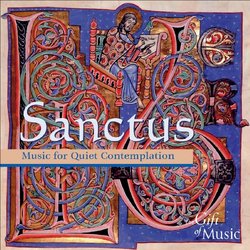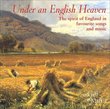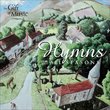| All Artists: The Monks & Novices of Saint Frideswide;Jon Banks - harp;Marguerite Hutchinson - Northumbrian pipes Title: Sanctus Members Wishing: 1 Total Copies: 0 Label: The Gift of Music Original Release Date: 1/1/2004 Re-Release Date: 3/2/2006 Genres: Pop, Classical Styles: Vocal Pop, Opera & Classical Vocal, Chamber Music Number of Discs: 1 SwapaCD Credits: 1 UPC: 658592110722 |
Search - The Monks & Novices of Saint Frideswide;Jon Banks - harp;Marguerite Hutchinson - Northumbrian pipes :: Sanctus
 | The Monks & Novices of Saint Frideswide;Jon Banks - harp;Marguerite Hutchinson - Northumbrian pipes Sanctus Genres: Pop, Classical
SANCTUS - Music for Lindisfarne The Venerable Bede informs us in passing of musical activity in the monasteries of Northern England: 'all those present at a feast took it in turns to sing and entertain the company', and he... more » |
Larger Image |
CD Details
Synopsis
Product Description
SANCTUS - Music for Lindisfarne The Venerable Bede informs us in passing of musical activity in the monasteries of Northern England: 'all those present at a feast took it in turns to sing and entertain the company', and he refers specifically to the harp. This reference finds its echo in the great poem of Beowulf in which, at court before King Hrothgar, a poet sings a song of creation: the monster, Grendel, must lurk in the outer darkness and endure the 'din of merry-making inside the hall, and the sound of the harp and the bard's clear song'. The music on this album is a re-creation of music that may have been familiar to the scribes of the Lindisfarne Gospels. It combines plainchant - the sacred vocal music of the early church - with Celtic harp and Northumbrian pipe. The harpist improvises on sacred tunes, the piper plays eloquent versions of early Northern folk melodies. Marguerite Hutchinson - Northumbrian pipes (4, 8, 10, 12, 14) Jon Banks - harp (1, 3, 9, 13, 15) With The Monks & Novices of Saint Frideswide (2, 5-7, 11, 16) The nature of the music of Lindisfarne at the time of the creation of the Lindisfarne gospels must always remain conjectural. Without clear written evidence from the period, any attempt to re-create that music will always have a certain element of fantasy - and it will always be tempered by our modern minds and our inevitably different perspective. So this album cannot be claimed as a definitive academic exercise. But the music cannot nevertheless be so far removed from something that the monks of Lindisfarne might have known. If they had music in their churches and chapels, and used it as part of the liturgy, as part of the worship of God, then they would have known the plainchant music we have assembled here. They may have had strange variants to these tunes and words that were not written down, but the underlying chant, taken from early English sources, would have been fundamentally the same. We do not know how they performed this music, but again, the sound of men's voices ringing out in a broad acoustic cannot have changed radically over the centuries. Bede's 'Ecclesiastical History of the English People' refers specifically to music, although in only a few places, and never as a major subject. From Bede's writings we can be certain that the harp was used for entertainment, and that singing took place during feasts. Certain passages from 'Beowolf' confirm this. The harp would not have been like the modern concert instrument of today, but rather a small, lightweight instrument that a seated player could easily hold on his knees. We have used such a harp for this recording. The harp music consists of improvisations on plainchant themes. The Northumbrian pipe is a traditional instrument of Northern England. Of course, we cannot say that it was known to the Lindisfarne scribes, but the instrument is of ancient origin. The music we have selected is from Northern sources. Some of it is relatively modern, and its subject matter may stray into the secular world, but the spirit of the pipes and the style of playing allow the imagination to place the music somewhere in the later years of the first millennium.

 Track Listings (16) - Disc #1
Track Listings (16) - Disc #1
